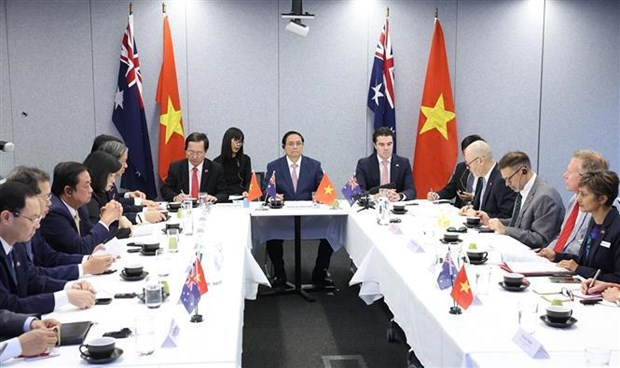
He particularly highlighted that the organisation has been on the right track with its studies on digital transformation, green transition, innovation and agriculture, among others, which are in line with Vietnam’s development policies.
He suggested CSIRO and its Vietnamese partners make efforts to remove roadblocks in their cooperation, adding the Vietnamese Government will pen mechanisms and policies to ensure that cooperation programmes are carried out smoothly.
Meanwhile, Australian Assistant Minister for Foreign Affairs Tim Watts said as sci-tech and innovation cooperation programmes are a pillar in the bilateral relations, which has been elevated to a Comprehensive Strategic Partnership, the Australian Government committed to enhancing the sci-tech cooperation with Vietnam through specific projects.
Minister of Science and Technology Huynh Thanh Dat said that Australia’s innovation programmes managed by CSIRO have helped Vietnam develop its fisheries, plantation and modern production sectors on the basis of the commercialisation of the research results.
For his part, Minister of Agriculture and Rural Development Le Minh Hoan said that cooperation with CSIRO helps Vietnam handle challenges in agriculture that the country is facing.
Vietnam hopes to receive CSIRO’s support to develop low carbon emission tra fish and shrimp farming models, he added.
On the occasion, Dat and CSIRO Chief Executive Doug Hilton exchanged an agreement on sci-tech and innovation cooperation in the presence of PM Chinh.
Established in 1916, the Australian national science agency has been one of the world’s largest mission-driven science and research organisations, with 5,500 staff and 57 establishments across Australia and representative offices in the US, Chile, France, Singapore, Indonesia and Vietnam.
The organisation has close cooperation ties with the Vietnamese Ministry of Science and Technology for years. Both sides signed agreements on research support in the fields of CSIRO’s strengths such as agriculture and food, healthcare and bio security, energy, manufacturing industry and land and water resources.
Vietnam and Australia promote education cooperation
Prime Minister Pham Minh Chinh, who is paying an official visit to Australia, attended and delivered a speech at a Vietnam – Australia education forum held in Canberra on March 8.
Australia is the top destination for Vietnamese students wishing to study overseas. Currently, more than 80,000 Vietnamese students are taking training course at different levels throughout Australia. Meanwhile, more than 200 Vietnamese and Australian educational institutions have developed cooperation programmes, with more than 5,000 joint research projects conducted.
At the forum, university leaders shared their various experiences and proposed solutions and orientations for higher education development. They dwelled on university governance and management related issues, including developing teaching staff, and improving the overall quality of tertiary education. They particularly focused on proposing education cooperation programmes between the two countries.
Addressing the event, PM Chinh reviewed major developments in Vietnam – Australia relations over the past half a century, saying that bilateral ties have flourished positively, resulting in the recent upgrade of ties to a comprehensive strategic partnership.
In particular, education cooperation is always a bright spot in bilateral relations and has recorded many important achievements, thereby contributing to creating and improving the quality of human resources for national development, he said.
According to the PM, Vietnam always attaches special importance to education - training and human resource development, especially high-quality human resources. It prioritises attracting foreign investment in education - training, although investment in this field remains modest, especially at the university level.
He therefore suggested that both sides strive to increase education - training cooperation practically, effectively, and comprehensively to further promote its role as an important pillar. This will serve to create fresh breakthroughs and to contribute to strongly elevating the recently upgraded Comprehensive Strategic Partnership, for the benefit of the people of the two countries.
The Vietnamese Government of Vietnam is committed to protecting the legitimate rights and interests of foreign educational institutions and foreign investors, for the sake of win-win outcome, he affirmed.
The PM appreciated the two education ministries forming a joint working group to support Australian universities in establishing branches in Vietnam.
He went on to propose increasing the number of and improving the overall quality of cooperation programmes between educational - training institutions and universities of the two countries. Indeed, the primary focus should be on research and development and application of scientific and technological advances in industries that Vietnam lacks and Australia has strengths in, such as artificial intelligence, big data, clean and green energy, and biotechnology.
Among other things, he underscored the need to strengthen the exchange of students and lecturers and promote scientific research cooperation between the two countries’ universities, including creating conditions for Australian professors to come to Vietnam in order to support the teaching of new fields of Vietnamese needs.
He outlined his expectations that universities and institutions of the two countries press forward with cooperation opportunities, sign documents, and swiftly implement investment projects in Vietnam together.
At the end of the forum, Vietnamese and Australian universities exchanged eight cooperation agreements in the fields of academic, curriculum, and research exchange; exchange of students and lecturers; and training in emerging and important industries such as artificial intelligence, big data, semiconductors, health sciences, environment, digital technology, and green energy./.VNA